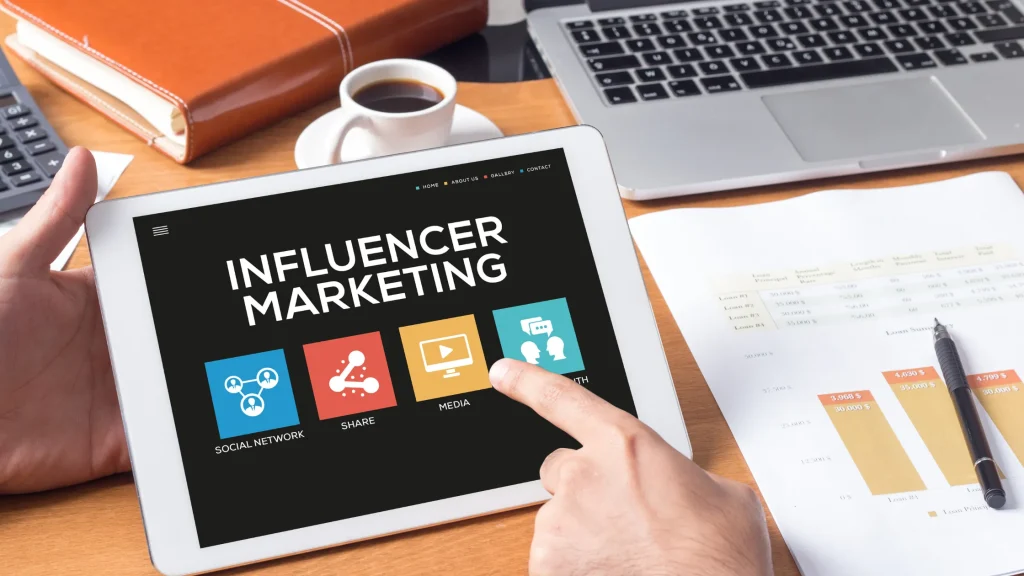In today’s digital age, small businesses face increasing challenges to stand out and capture the attention of their target audience. Traditional marketing methods often require significant budgets, making them less accessible for smaller companies. This is where influencer marketing steps in, offering a cost-effective and impactful solution.
By partnering with influencers—individuals with a dedicated following on social media platforms—small businesses can reach a larger, more engaged audience. In this article, we’ll explore how influencer marketing works for small businesses, the benefits it offers, and how to successfully partner with influencers to boost your brand’s growth.
Understanding Influencer Marketing for Small Businesses
Influencer marketing has become a powerful tool for small businesses looking to expand their reach and grow their brand. In simple terms, influencer marketing for small businesses involves partnering with individuals who have a significant following on social media platforms, with the goal of promoting products or services.
This type of marketing helps businesses connect with a larger audience in a more authentic and relatable way than traditional marketing methods.
What is Influencer Marketing?
Influencer marketing is a form of marketing that focuses on using key individuals, often called influencers, to promote products or services. These influencers usually have a loyal following on platforms like Instagram, YouTube, Twitter, and TikTok, and their endorsement can have a significant impact on consumer decisions. The collaboration between influencers and businesses helps to build brand awareness, drive sales, and create a buzz around a product or service.
Why is Influencer Marketing Important for Small Businesses?
For small businesses, influencer marketing offers a cost-effective alternative to traditional marketing strategies. Instead of spending a large portion of their marketing budget on TV ads or billboards, small businesses can partner with influencers who align with their brand values. This targeted approach helps to maximize the return on investment by reaching the right audience at a fraction of the cost.
Benefits of Influencer Marketing for Small Businesses

Cost-Effective Marketing Strategy
Influencer marketing is often more affordable than traditional forms of advertising. Small businesses with limited marketing budgets can partner with micro-influencers or nano-influencers who have a smaller but highly engaged audience. These influencers often charge less for collaborations, making it easier for small businesses to fit influencer marketing into their marketing budget.
Increased Brand Awareness
One of the biggest benefits of influencer marketing is the ability to reach a large audience quickly. By partnering with influencers, small businesses can increase their brand visibility and awareness. Influencers can expose your products or services to thousands of social media users, many of whom may not have come across your brand otherwise.
Building Trust and Credibility
Influencers have built a strong bond with their followers, and when they endorse a product, it adds a layer of trust and credibility. Small businesses can benefit from this trust by having influencers promote their products. When influencers recommend a product, their followers are more likely to trust the brand and make a purchase.
Access to Targeted Audiences
Influencers cater to specific audiences, which allows small businesses to reach their target demographic effectively. Whether you’re looking to appeal to millennials, parents, or fitness enthusiasts, you can find influencers who specialize in your niche. This ensures that your marketing campaign is seen by individuals who are most likely to convert into customers.
How Influencer Marketing Works for Small Businesses
Understanding the Basics of Influencer Marketing
Influencer marketing for small businesses involves identifying influencers whose followers match your target audience. Once you’ve found the right influencers, you collaborate with them on content that promotes your products or services. This could involve product reviews, sponsored posts, giveaways, or affiliate programs.
How Influencers Help Small Businesses Grow
Influencers provide businesses with the opportunity to tap into an established audience. By creating compelling content, influencers promote products in a way that feels natural and engaging. This helps small businesses attract new customers and increase sales. Moreover, influencer marketing campaigns can help businesses grow by fostering brand loyalty and creating long-term partnerships.
Influencer Marketing Campaign Workflow
An influencer marketing campaign typically follows a few essential steps:
- Identify the right influencers: Use influencer marketing platforms or social media to find influencers who align with your business values and target audience.
- Reach out to influencers: Contact potential influencers and discuss campaign details, including compensation, deliverables, and campaign goals.
- Collaborate on content creation: Work with influencers to create content that promotes your product in an authentic and engaging way.
- Track performance: Use metrics like engagement rates and conversion rates to measure the success of the campaign.
Choosing the Right Influencers for Your Small Business

Different Types of Influencers and Their Roles
There are various types of influencers to choose from, each offering unique advantages.
- Nano-Influencers: These are influencers with a small but highly engaged audience. They typically have fewer than 10,000 followers but can provide high levels of engagement and trust.
- Micro-Influencers: With follower counts ranging from 10,000 to 100,000, micro-influencers offer a balance between reach and engagement. They are ideal for small businesses looking to target a specific niche.
- Macro-Influencers: These influencers have a larger audience, typically between 100,000 to 1 million followers. While they offer wider reach, they can be more expensive to partner with.
- Celebrity Influencers: Often individuals with millions of followers, celebrity influencers can offer substantial brand exposure but at a higher cost.
How to Identify the Right Influencers for Your Brand
When looking for the right influencers to partner with, it’s important to consider factors like audience demographics, engagement rates, and brand values. Small businesses should look for influencers whose followers align with their target audience, whether that’s a specific age group, location, or interest.
Tools like social media platforms, influencer marketing platforms, and agencies can help businesses find the best influencers for their marketing campaign.
Evaluating Influencer Engagement and Authenticity
It’s not just about the number of followers an influencer has. Small businesses should focus on the engagement rate, which indicates how well influencers interact with their audience. Influencers with high engagement are more likely to drive conversions and increase brand awareness.
Platforms to Connect with Influencers for Small Business Marketing
Popular Influencer Marketing Platforms for Small Businesses
There are numerous platforms available to help small businesses find and work with influencers. These platforms offer tools that allow businesses to search for influencers based on specific criteria like location, audience size, and niche. Some popular platforms include:
- Upfluence
- Influencity
- AspireIQ
- Grin
Finding Influencers on Social Media
Many small businesses also choose to directly search for influencers on social media platforms like Instagram, TikTok, and YouTube. By using hashtags relevant to their industry or products, businesses can identify influencers who are already talking about topics related to their products.
Best Platforms for Influencer Campaigns
Choosing the right platform for your campaign is crucial. For example, visual products or services might do well on Instagram or Pinterest, while educational content might perform better on YouTube or LinkedIn.
Also Read: How to Build a Digital Marketing Strategy in 7 Steps
How to Work with Influencers Effectively
Setting Clear Goals and Expectations
Before partnering with influencers, small businesses should define their marketing goals. Whether it’s to increase brand awareness, generate leads, or boost sales, setting clear expectations ensures that both the business and the influencer are on the same page.
Reaching Out to Influencers
Once you’ve identified the right influencers, reaching out is the next step. Many influencers have their contact information listed in their social media bio, or they can be contacted through influencer marketing platforms. Be sure to personalize your message and explain why you think they would be a good fit for your brand.
Collaborating on Content Creation
Work with influencers to create content that aligns with your brand and resonates with their audience. Whether it’s a product review, tutorial, or giveaway, influencer content should be authentic and engaging to drive positive results.
Measuring Success and ROI of Influencer Campaigns
Once your campaign is live, it’s essential to track key metrics like reach, engagement, and conversion rates. By measuring the effectiveness of the campaign, businesses can determine their ROI and adjust their strategies for future campaigns.
Is Influencer Marketing Right for Your Small Business?
Influencer marketing can be an incredibly effective tool for small businesses looking to grow their brand. By partnering with the right influencers, businesses can increase brand awareness, drive sales, and engage with a targeted audience.
However, it’s important to choose the right influencers and set clear goals to ensure success. With the right strategy, influencer marketing can help small businesses achieve their marketing goals and thrive in today’s digital world.
